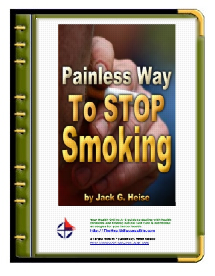|
How to Stop Smoking
If you are about to quit, do you know what to do to fight off that urge to smoke another cigarette?
There are two factors that will determine your success: Of course it’s possible to get motivated to quit, yet you fail for a variety of reasons. Most who try to quit, fail to do so and have to try several times before they succeed. Should you have any doubts about giving up smoking, put it off until you are determined to do so.
Why Do People Smoke Cigarettes?
Cigarette advertisements have said time and again that cigarette smoking is dangerous to one's health. According to United States studies, cigarette smoking is responsible for one out of every five deaths in the U.S. Smoking robs more than five million years of lifespan because of premature death. Cigarettes are the most addictive and destructive over-the-counter drug known to man. Cigarette smoking is equivocal to lung cancer. With this said, one may wonder why do people still smoke cigarettes? Before World War I, tobacco was smoked in the form of cigars. They were primarily smoked by the wealthy. Cigarettes, which are basically leftovers of the cigar making process, were smoked by the less fortunate. The number of people who smoked cigarettes boomed when tobacco companies started to mass-produce cigarettes. Their clientele were the soldiers of World War I. It took some time before a deadly by-product of smoking became evident. Doctors only noticed the increase in lung cancer incidents 20 to 30 years after WWI. With this increase, Reader's Digest published an article "Cancer by the Carton,” which prompted the public to be aware of the effects of cigarette smoking. Similar articles have been published to condemn cigarette smoking. Medical advancements have proven the correlation between cigarette smoking and lung cancer. But despite all of these, lung cancer has remained to be one of the most common diseases in the modern world. Cigarettes' most common ingredient is nicotine. Nicotine is more addictive than heroine, which is in fact, a prohibited drug in most parts of the world. Aside from heroine, doctors ranked nicotine ahead of alcohol and cocaine in terms of dependence. Indeed, research has shown that smoking four cigarettes a day can induce life-long addiction to nicotine. People who smoke tend to see smoking as a part of their personality, as something that they cannot live without. That is a clear sign of addiction. And the addiction to chemicals, which in the case of nicotine, is considered a sickness. What adds to the addiction to smoke cigarettes is the psychological pleasure or satisfaction a smoker gains when puffing a cigarette. Smokers describe smoking as a "pat-on-the-back" after a hard day's work. One smoker confesses that it is not the taste of the cigarette; it is actually the sense of satisfaction that you get from it that keeps you smoking. Studies have also shown that depression is twice as common to people who smoke against those who do not smoke. Some also use cigarettes as an ersatz activity to pass time and be patient. Just like in war movies, when a soldier is waiting for the signal to attack, he is seen as holding a gun on one hand and a cigarette on the other. Nicotine triggers the smoker's brain to be more efficient in processing information. It also reduces anxiety and induces euphoria. Researches have also shown that nicotine induces alertness and arousal, and sedation and relaxation based on the dose of nicotine intake. These effects, though, do not outweigh the harmful effect of nicotine addiction, which is lung cancer, and possibly other ailments, which will all eventually lead to death. People who cannot stop from smoking may see it the other way around. They may be blinded by the short-term effects of nicotine. Aside from nicotine, smokers rarely know that a cigarette contains acetylene (fuel used in welding), cyanide, nitrogen oxide, and carbon monoxide, all of which are harmful chemicals. These chemicals are also used as poison. Psychosocial factors also contribute on why people continue to smoke. Persons surrounded by people who smoke, like family and friends, can soon develop the habit of smoking. And as its addictive nature, the smoker will have a hard time quitting the habit. An environment permissive and indifferent towards cigarette smoking will produce significant numbers of smokers. Recently, researchers have reported that genetic variables also play a role on why people keep on smoking. These genetic variables affect the tendency of a person to smoke to the chances of quitting. Given the many facts and figures related to the hazards of smoking cigarettes, the percentage of smokers has not experienced any considerable decrease. In fact, it continues to increase. The World Health Organization has estimated that by year 2020, tobacco will kill more people than any single disease in the world. Educating the people about the dangers of smoking doesn't seem to strike sense out of smokers. For some smokers, thinking that smoking is directly related to lung cancer and eventually death is a myth yet to be proven. But whatever the reason why smokers have why they still make smoking a habit will never justify that smoking is indeed an addiction, and sooner or later, this will eventually cause death.
What Causes addiction to Cigarettes? What makes smoking so habit forming? Nicotine creates a biochemical reaction in your body that has an immediate effect on your mood, your ability to reason, and your metabolism. The more that you smoke, the higher level of chemical dependency will be reached. Light smokers can also become just as dependent on cigarettes because of nicotine’s psychological impact. In this way it can affect moods and feelings in certain situations. THE EFFECTS OF NICOTINE It is only a matter of seconds after that first puff that nicotine starts to have an effect on your central nervous system, and the rest of your body. Certain areas of the brain, when stimulated by nicotine, help you think more clearly. Other areas of the brain lie in a pleasure center which when stimulated, can make you feel more relaxed and less anxious. Nicotine also affects the hormones produced by the body which creates a chemical dependency to nicotine and the accompanying craving. Heavy smokers have become dependent on heightened levels of hormones, stimulated by nicotine, which can have an addictive quality. Why is it Hard to Quit Smoking?
Smoking is emerging to be one of the major causes of death in the modern world. This is attributed to the growing consumers of tobacco. Tobacco is responsible for the death of 1 in 10 adults all over the world, which translates to around 5 million deaths every year. It is because of this fact that cigarette smoking is now a public health priority. As we mentioned previously, the boom in cigarette smoking occurred sometime during the First World War. Tobacco companies were successful in including their products as part of the military ration. At the time, soldiers under the stress of warfare took up smoking. And since then, the tobacco industry has grown through an increased consumer patronage all over the world. With the prevalence of cigarette smoking came its adverse health effects on its consumers. Smoking poses dangers directly and indirectly to the public. An indirect public health concern that cigarettes may pose is accidental fire. As for the health risks in smoking tobacco, the disease mainly strikes the cardiovascular system, resulting to heart attack, respiratory tract diseases, and even cancer. In spite of these risks, the number of cigarette smokers all other the world has not dropped considerably. Though several smokers claim to have been meaning to quit this habit, they just find it so difficult. The fact is that after smoking for quite sometime, quitting smoking will prove to be very hard, but not impossible. Foremost, this is because most smokers become addicted to the nicotine contained in tobacco products. Nicotine has a deadly addictive power. How? When a person puffs a cigarette, nicotine particles find their way to the lungs through inhalation. From there, nicotine is absorbed into the bloodstream just like the oxygen people breathe. It travels with the blood to the brain where it locks onto certain receptor areas. Dopamine is then released into the brain. This is the chemical that makes the smoker feel a euphoric sensation. Smokers find it difficult to quit because they come to be dependent on this good feeling. And in wanting to experience this repeatedly, this leads to dependence – a sign of addiction. A person who attempts to quit may experience withdrawal symptoms. Topping the bill of withdrawal symptoms is depression. With the absence of the chemical that produces the relaxing feeling, the brain becomes distressed without it. Other withdrawal symptoms from smoking include: - Headaches, dizziness, and nausea Not knowing what to do with their hands is another common complaint among ex-smokers while quitting. Once people get hooked, smoking becomes a big part of their lives. They seem to enjoy holding on a stick of cigarette and puffing on them. And after a long period of lighting up, it becomes a routine. As a fact, humans are creatures of habit. By some force of habit, smokers find themselves reaching for a cigarette and lighting it up automatically without thinking about it. Certain “triggers” in the environment may also hamper a smoker’s desire to quit. Things may turn on a smoker’s need for a cigarette. These may be feelings, places, and moods. Even the things done routinely may trigger this craving for a smoke. For those who have been smoking for quite a while already, they may not realize it but they form some emotional attachment to cigarettes. They find the cigarette calming and comforting during those stressful times. Cigarette smoking somehow becomes an extension of their social life, particularly when they are emotionally at the highest or lowest. Giving the smoker a feeling that giving up smoking would seem like giving up a trusted friend. These are only some of the major reasons why it is hard to quit smoking. But there are also several strategies and quitting techniques that may aid smokers to finally give up on this tenacious habit. Quitting smoking all begins with one’s intention to stop. They must have the will power to overcome the craving for smoke. There are also a lot of quit smoking products in the market. These may also be worth trying. Support groups are proved to be very helpful, too. Smokers must understand that to quit smoking may take more than one attempt. They must also try several methods before they can finally succeed. Smoking is a stubborn habit because it is closely tied to the acts in the course of people’s everyday lives. Even so, with determination, will power, and a strategy, to quit smoking is not out of the question and we will discuss some of the methods in further chapters.
Cigarette & Tobacco Risk Factors: IF you smoke: Now let’s just think for one short moment: wouldn’t it be very important for you to increase your chances of living from two to twelve times longer, gain many extra years of happy, healthy existence, and save thousands of dollars in increased medical costs? Another overlooked benefit is the amount of money saved by not buying cigarettes in the first place.
Statistics attribute the majority of the cause of death every year as a result of or as aggravated by smoking. The number of smoke related diseases such as cancer, respiratory problems and heart ailments increase yearly. Certain disabilities also result from these tobacco related diseases. It could also result in a decreased ability to enjoy physical abilities because of the ailment or side effects like breathing problems. Reduced life expectancy, the smoker may lose 10-15 years of his or her life as a consequence. Medical expenditures will also have to be addressed as most, if not all, smoke related illnesses require treatment, services and medication. Health care services do not always come free. At the same time, there will be lost productivity when the ailing smoker is forced to retire to the hospital bed and refrain from working. Thus the earning capacity declines. Instead of bringing in more money to the household, the money had to be taken out. The environment of the smoker will also deteriorate because of the fumes. The car is one place where the smoker could comfortably light up a cigarette. Definitely, the interior will smell, ashes will accumulate and upholstery may get burn holes. Same thing goes if the smoker freely lights up anywhere inside his or her house. Smoking gives a higher risk of starting a fire. Several fires had been discovered to have originated from a cigarette left lit. Air pollution is also further aggravated. This is due to the constant release of carbon monoxide in the proximate vicinity. This contributes to the high temperature of the environment. Smokers also harm their neighbors through secondhand smoke. Non-smokers exposed to the carbons emitted are susceptible to smoking related diseases. If these exposed non-smokers have illnesses, secondhand smoking could further aggravate the situation. In acquiring insurance policies, there is the trend now to charge higher premiums to smokers. The vice is considered a high-risk. Smokers who die early do not get to enjoy the fruits of their pensions. This means less social security benefits. Cigarette smoking also affects the overall aesthetics of the person. These are offshoots of smoking that cannot be disregarded as they affect the self regard of the person and also his or her relationship with others. Rectifying these could actually cost money. Bad breath brought about by smoking would require gum or mints to overcome the odor. The smoker may also opt for breath fresheners, which are even more expensive. Cigarette components stain the teeth. Having yellow teeth means extra charge from the dentist aside from the usual cleaning. Smokers were also found to have darkened gums. Smoking could also effect the wrinkling of the skin earlier than the usual. Smoke makes clothes dirty and the results often require the services of a dry cleaner to be remedied. The smoke can also result in bad smell in the skin and hair. Smoking also has emotional costs. The dependence to smoking when one gets addicted can be very restricting. There is also the pressure to quit smoking as the smoker realizes the harmful effects to himself and to his or her family. A person with a smoking-related disease will not be the only one who will suffer. Immediate family members and friends will definitely feel the burden of the illness. There is the constant sense of helplessness in addressing the vice and its side effects. A lot of money has actually been reduced to ashes because of the vice. That money could in fact be saved from the actual and derivative costs only if the person stops smoking!
Stop Smoking Strategies
HOW YOU CAN BEGIN TO QUIT Many people have found that including physical activity in their program to quit smoking has added a tremendous benefit to assist in quitting. There are many reasons for this:
When people are more active, they gain confidence and like themselves more. They feel more energy, and are more capable of dealing with tension in their lives. With increased activity, the smell of tobacco actually becomes offensive. Whenever you feel the need to smoke after you have decided to quit, get up and move around instead. A brief physical activity can provide you with the lift that you may have received from nicotine. What about the doubts you may be feeling now? Most smokers will get a sense of doubt when they read the questions above. You probably are not confident in your ability to follow through with resisting any future craving to smoke, or finding something to substitute for the feelings that smoking has given to you. In order to have the confidence to quit, you :
Smoking Support Groups Support groups have been around for the past fifty years. But what are these support groups for? Support groups are groups of people who help a person with their problems. Alcoholics, smokers these are just some types of persons that a support groups help. While you’re in a support group, helping yourself quit is a sign that you’re serious about quitting smoking. Be patient. It is natural to expect that you could overcome smoking in a short period of time, but it is also natural to know that it is not possible. Identifying yourself as a former smoker doesn’t happen overnight. It takes time to finally quit smoking. If you’ve been a smoker for a good number of years, it may take sometime for you to break the habit. Lapses could occur. So be patient. The process will help you. Live by the day. Stop thinking about things in the long run, instead, put your focus on the present. At the start of the day, tell yourself you will not touch a cigarette for today. This may be hard at first but it could be a routine you could get used to in the days to come. Thinking of not touching a cigarette forever might be overwhelming for a smoker. Settle in for something that is more realistic, start with today. Be positive. You don’t have to be hard on yourself if you want to stop smoking. If you have tried to quit smoking and have failed in doing so in the past, don’t think of it as a failure. It will only make you think that you can’t do it again. Instead, use this as a motivation in quitting. Tell yourself that you can conquer this weakness. Learn from your past experiences. Now you have an ace because you’ve been through that stage and know the things that you have to avoid. You only plan on quitting smoking cigarettes, not quitting on your life. Overcome the feeling of withdrawal by taking care of your body’s needs. Be sure to eat a well-balanced diet. You also have to get enough rest. You might be feeling extra fatigued especially during the first week so be sure to take a good rest and give your body the nutrients it needs. Drink lots of water and exercise daily. Drinking water will help your body get rid of the toxins inside as well as to replace the liquids you lost while exercising. Give your body extra energy by taking vitamins daily. This will help you get back the vitamins you lost in years of smoking. Avoid alcohol. If you’re a new quitter places where you have to drink alcohol are places where you could also smoke. Having a drink or two will most likely trigger your urge to have another light. And this is a very dangerous phase for a new graduate. Avoid stress. Stress is a good trigger for you to smoke again. After all it is stress that drove you into your first cigarette pack right? Tension is experienced on the first phase of withdrawing. Relax. Take a deep breath and keep your mind focused on your goal. Take time everyday to cope up with stress. There’s only one thing that could solve this. That is to do things that will relieve it, like reading a good book or playing your favorite sports. A nice warm bath could also be a way of relieving stress. Take time to enjoy the good things life has to offer. Don’t take on quitting to seriously for it may develop stress. This may even make your attendance to the support group meetings an extra load. Keep the bad thoughts away. There may be times that you would experience anxiety because of the bad turn of events. Take on it as any person would do. Accept it as a part of life. Instead of moping around, treat yourself!
Quitting is a process. Getting yourself in a support group alone will not help. It needs determination and courage for you to stop that bad habit of smoking.
How to Help Your LOVED ONES Stop Smoking! Seeing your loved one addicted to something is hard, especially if it causes harm to himself. Many people have tried helping someone close to them quit the habit if smoking. Some succeed, some don’t. What do you do when someone you love has turned into a smoker?
If the smoker doesn’t want to quit smoking, don’t nag at him to doing so. Nagging at the person to quit or making him feel guilty of smoking would only add stress and anxiety to the person. This would definitely drive him more into lighting another stick or worse an entire pack just to relieve the negative feeling. Try talking to them about their habit. Do this but be sure not to obviously point out their smoking habit. Try telling them the dangers brought about by smoking; the things that cigarette smoke may be bringing not only to the smoker but to the people around him too. Discuss with him the possible illness that he could get because of smoking. Don’t dwell on the negative side. Talk about the things that the smoker would be getting once he breaks the habit. If your husband is a smoker, tell him that you still want him around for the next fifty years and would not want to lose him just because of the illness he might possibly suffer from smoking. Talking about positive things will help enlighten his mind about smoking. Show them that you really care. Assurance that whatever happens you will still be there for them is a great motivation for the smokers to quit. Let them know that it’s not for you that they have to stop but for them. Make them feel important and loved. Tell someone not to smoke in a polite manner. Never point out to a person that he is not to smoke anywhere. If someone you know tells you that he wants to quit smoking, congratulate him. Having someone tell you that he wants to break a habit is a sign of courage. It takes courage to will oneself to stop smoking. Quitting is hard in the first week. Smokers also suffer from withdrawal syndrome. You need to understand what they are going through and learn to dwell on the fact that it isn’t easy. Instead of nagging at your husband because he is always irritated, give him time to relax. Anxiety is normal for someone who quits a habit. Help them by talking to them about ways they could quit smoking. Discuss with them the possible solutions as well as where they could get help. Encourage them to continue what they started. If someone you knew is on the process of quitting, help them keep going. A feeling of loss is often felt by someone who just quit. Help them fight the feeling by offering substitutes to smoking. Engage them to a new hobby. Having something that will occupy their time will help them feel whole again. Get involved with the decision of the person to quit smoking. If your husband tells you that he wants to stop don’t give him a blank look. Give him a hug and tell him that you’d support him every step of the way. Steer him into the quitting process. There are support groups available for those who wanted to stop smoking as well as for the people who’s helping their loved ones to stop the habit. Quitting doesn’t happen overnight. It takes time before someone could say he has really stopped smoking. Lapses happen. It only takes a single event for someone to have him lighting another stick or worse, an entire pack. If this happens never fall in to the mistake of raging at the person about not keeping his word. Instead, have a quiet talk with the person. Talk to him about the commitment he has got himself into. Tell him that you understand that he still craves for a cigarette but also tell him that he has promised to quit. Encourage him to continue what he has started. Tell him that he has overcome the urge for months now and there’s no reason why he could not overcome it for the months or years to come.
How To Handle The Urge
To Smoke Again
Your artillery. There are several weapons that you can use in your fight to quit. EACH OF THESE WEAPONS WORK- THEY HAVE BEEN PROVEN You may use one, all, or a combination of several to achieve your goal. The urge to smoke is immediate, and usually lasts for five minutes. If you can resist for that period of time, you reduce the urge.
Let’s Start To Quit Right Now The first thing to do is set a date when you are going to quit smoking. Let’s start one week from today. That will give you plenty of time to practice with the weapons in your arsenal. Eight days from today, it will be the beginning of the end of your smoking habit. Days 1 and 2 Examine your smoking behavior for the first two days. Every time you light up, ask yourself: Today is the big testing day. If you haven’t already tried it, skip those one or two cigarettes that you feel may be the toughest to give up in your daily routine. Pick the ones that you rated “difficult” during your monitoring period. Tension and negative emotion Days 5, 6, and 7. You are now heading down the home stretch. In the next three days, your goal is to come out of this week smoking half the cigarettes that you would normally smoke. If you started as a one pack a day smoker, cut back to ten cigarettes per day, or less. The fewer the better. Discuss with your doctor about the feasibility of a patch or nicotine gum. Nicotine is the hook that has gotten you to smoke which carries the harmful effects to your body. With the help from the patch or the gum, you will have all he tools you need to successfully quit. The patch or gum will give you a steady influx of nicotine into your system, which will be reduced slowly over a period of several weeks. DO NOT SMOKE WHILE ON THE PATCH. You could experience a dangerous overdose of nicotine. NOTE; Pregnant women should not use the gum or patch. Smokers with any form of heart disease should consult with a physician before using.
The Free Report is a comprehensive pain-free way to stop smoking, plus there are FIVE more methods of stopping smoking covered in the eCourse. Just subscribe today, and you will be reading the detailed instruction manual and worksheets straight away!
Coping With The Symptoms Of Withdrawal Dizziness may occur during the first one or two days. Take a quick break, it will pass. Headaches may appear at any time during the first weeks. Try to relax. Take any usual remedy for headache, a cold cloth on the back of your neck, or relieve the stress by taking a short walk. Tiredness may occur during the first few weeks, but if you meditate or relax during the first few weeks, it will pass. Coughing may actually increase during the first few days, simply because the residue from the smoke has not been flushed from your system. Tightness in the chest may occur in the first few days. Rest and take deep breaths, it will go away. Sleeping problems may occur in the first few days. Try to stay away from drinks that have a high caffeine content, try not to exercise too strenuously in the hours prior to bedtime. A hot bath prior to retiring at night may also be helpful. Constipation may occur in the first month after you quit. If this occurs, eat foods with a high fiber content, drink plenty of fluids, and do some light exercise. Concentration may tend to wander during the first few weeks. Be ready for this, take a break or do something physical for a short period of time. The Free How to Stop Smoking eBook download available on this page will give you an example form to chart your progress as you begin to give up cigarettes. They are all self explanatory and should prove to be a tremendous asset in assisting you to give up your habit. On a daily basis, chart each cigarette that you smoke during the day.
Diet change strategies: Nutrition support can be a huge help with Addictions but in most cases will not cure them. Even products that are as strong in their support for your body with broad spectrum nutrition and powerful dexification offer little that directly support the breaking of addictions. Vitamin & Nutrient Associations For many people who want to stop smoking getting onto good and balanced nutrition in your diet can help reduce cravings. If these people take active steps to deal with their addiction to cigarettes then they often stay off them. If on the other hand they believe that the nutritional program is all that is needed then they generally fall back into the habit. This is a major point, a high quality nutrition program is a huge support for people with addictions but it’s job is to give a supporting environment for you to work through the issues of your addiction and come free of it. Nutrition by itself is normally not enough to let you overcome the addiction.
You may find benefit from our information on detoxification as well as a bit about detoxing because of change of diet Further reading through our articles on health issues will give you a body of information that will help you decide what options you have to deal with the underlying causes of your problem through giving your body the nutrition products that will assist you body to heal from the inside out. We wish you well in your search for solutions to this problem and your movement towards better health in all areas. More Resources available about How to Stop Smoking : The Free Report is a comprehensive pain-free way to stop smoking, plus there are FIVE more methods of stopping smoking covered in the eCourse.
We also feature new health articles & self care solutions every month in “Your Health Success” our FREE Health Magazine, so subscribe today to stay up-to-date!
 to “Your Health Success” our monthly F’R’E’E’ Newsletter
Back to Top of your health online How to Stop Smoking page *** GENERAL RELEASE AND ASSIGNMENT I understand that in submitting my material for publication I am granting the rights to reproduce this material on the internet or in other form and I have read the conditions above
============================================================
|







